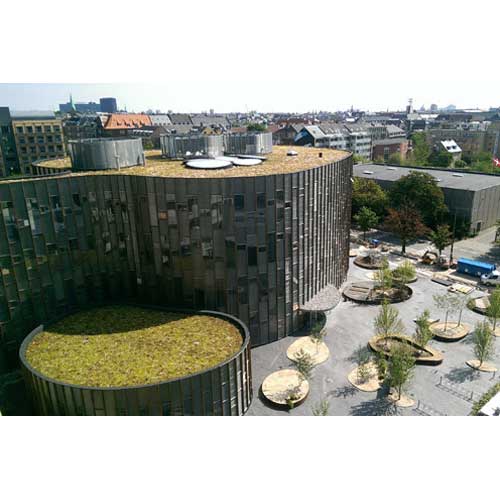Name: Federico Cozzi
Job Title: Laboratory Manager
Company: Copenhagen University - Department of Plant and Environmental Sciences

The new Copenhagen University building where the Department of Plant and Environmental Science is based
Copenhagen University use Peak Hydrogen generator as carrier gas for Shimadzu GC-MS
The Department of Plant and Environmental Sciences at Copenhagen University focus on researching plants, microorganisms, animals and the environment for the wider goal of finding solutions for the sustainable production of food and other biological products. Their mission is to stimulate fundamental research and the synergy between basic and applied research in biology and environmental science.
Federico Cozzi is the Laboratory Manager for the Section for Molecular Plant Biology and has replaced his lab’s gas cylinder supply with Peak Scientific Precision Series gas generators for GC and GC-MS for their analysis.
In a recent study, using Peak’s Precision Series supplying Shimadzu’s QP-2010 Plus GC-MS with hydrogen carrier gas, Trine Bundgaard Andersen, Federico Cozzi and Henrik Toft Simonsen carried out analysis on sesquiterpenoids, a subgroup of terpenoids in their research paper “Optimization of Biochemical Screening Methods for Volatile and Unstable Sesquiterpenoids Using HS-SPME-GC-MS”. The aim of their research was to decipher an efficient method for analyzing these volatile compounds. Knowing that the choice of fiber material and injector temperature could have a profound effect on the sample profile due to chemical rearrangements which can occur with the fiber materials, the team were able to discover the optimal fiber material and temperature for a fast, reproducible HS-SPME GC-MS method increasing accuracy in results. They found that an absorbent fiber material, PDMS, significantly reduced the likelihood of chemical rearrangement as opposed to adsorbent fibers such as PDMS/DVB, PDMS/CAR and PDMS/CAR/DVB. The likelihood of chemical rearrangement was further reduced with an injection temperature of 160°C. You can read the full paper here.
We asked Federico about the benefits Peak’s Precision series had brought his lab:
Typically, what is the focus of your GC analysis - what sort of applications?
“The main focus of our line of research is Plant Metabolites.”
What Peak Scientific generators do you have in your laboratory and what GC instruments do they supply?
“We have a Precision stack with the following generators: Precision Hydrogen 200, Precision Hydrogen Trace 500, Precision Air Compressor, Precision Nitrogen & Precision Zero Air. These are used to supply carrier gas and detector gas to our Shimadzu QP-2010 Plus GC-MSs.”
What prompted you to choose a Peak generator and how long have you used them?
“We were looking for an alternative to cylinder gas supply. The Peak generators were highly recommended by Shimadzu and were sold as a package with the GC-MS. We have been using these generators for over a year now.”
What has been the key benefit of deploying Peak generators as opposed to your previous gas supply solution?
“We decided to make the switch from cylinders to hydrogen gas generators as we wanted to reduce the costs associated with helium cylinders such as regular cylinder deliveries and saving time by not needing to change over cylinders.”
How would you describe your purchasing experience with Peak in terms of speed of response, ease of ordering, catering for your needs and timing of delivery?
“Although the generators were purchased alongside our mass specs through a third party as opposed to being purchased directly from Peak, the delivery of my order was satisfactory.”
Have you ever had a site visit from a Peak engineer, if so, could you describe your experience of this support?
“Although we purchased our gas generators via a third party, Peak look after the service and support of our generators. I would say overall I have received very good support from Peak.”
Federico’s experience with Peak is, in many ways, a typical one. Peak’s Precision series gas generators are very often sold alongside Shimadzu’s GC-MS as a trusted source of carrier and detector gas. This is due to the product’s reliability and the unrivalled support that is provided by Peak’s global team of Field Service Engineers who perform generator maintenance and servicing on-site regardless of location.
Another common theme highlighted by Federico was his reason for switching from helium cylinders to an on-site supply of gas. The costs associated to helium cylinders, to which Federico refers, are the continual delivery costs, the administrative costs of ordering and reordering cylinders and the efficiency costs of lab workers needing to stop analysis to changeover cylinders as well as to handle stock levels. The other benefit of using Precision generators over helium cylinders is that the consistent purity achieved by a gas generator cannot be matched by a gas cylinder as impurities can corrupt cylinder purity as it reaches the lower end of its capacity. More and more labs are choosing to switch their helium cylinders to on-site gas generators due to the inconsistencies and costs associated with bulk supplied gas.
The Department of Plant and Environmental Sciences' vision is to carry out distinctive and internationally recognized basic and applied research which will contribute to solve the challenges that global society is facing in relation to the production of food and other biological products and the environment. Peak are pleased to be their local gas generation partner, providing the gas to their analytical equipment.